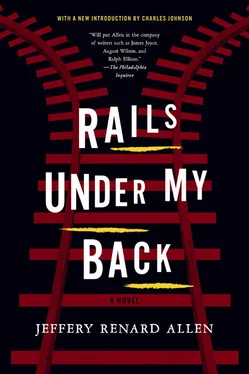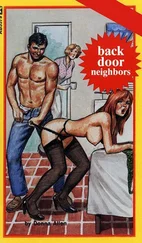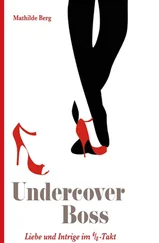Inez sat at the table across from him. Junior, she said.
Gracie didn’t know if the pet name was meant for Lucifer or John.
Mamma, this Sheila.
Mamma, this Gracie.
How yall doin?
Fine.
Just fine, Gracie said.
Glad to meet yall. So these the girls yall been talkin bout?
I heard a lot bout you too, Gracie said. John get his good looks from you.
Inez laughed. Oh, boy. Junior was the blackest baby I ever seen.
How could this be true? Inez and John had the same light tight skin, the same compact physique, though he was wider.
Lucifer came out light then got dark, Inez said, like a yam toasted in the oven, then went light again.
Later, in the privacy of the car:
I like yo Mamma.
Yeah, John said. Mamma. She been a woman all her life.
Gracie pondered this for a moment. Let it pass. I like George too. Yo stepfather.
Step? He ain’t step nothing to me.
But, he seems like a nice man.
Gracie, you jus don’t know. I seen it. John spoke, anger in his face. He got land. Oil wells. All sorts of stuff. And …
John, you ain’t—
He got a long way to go befo he be my step anything.
Inez had met George right before the war — or right after; this she always forgets — when Lucifer (born when the war began) was learning his first sentences and John was still wrapped in swaddling clothes (no, he was born when the war ended; two years apart, they are two years apart) — John, a fine package dropped in the lap of Pappa Simmons and Georgiana. Georgiana was dead now, and George and Inez cared for Pappa Simmons in the basement of their house, dodging their neighbor’s complaints about the whooping hound-dog baying of the Indian (as he thought of himself). Pappa Simmons had collected a set of bitter memories, stored them like preserves in his pantry, and put ice in his voice when he told you about them.
Lots of folks had already come up, he said.
You took a path that led over the hill so that you could reach the station without having to pass through the streets of the town. You forced your way through the brambles that crowded the narrow path, your head bent sharp-angled to the road. The hill was steep. You breathed deeply.
They lived in places lot worse than the one yall live in, he said. Inez, member that first apartment over on Peoria?
Pappa, don’t drudge up the past, Inez said.
We had to walk to the market and buy coal fo heat.
And it were six of us in one room. Me, Pappa, and Mamma and this other family. You had to be very private cause it was always somebody else in the room.
Hell, but that ain’t nothing. There were this one town where everybody jus packed up and leave. Even took the church. Put the Bibles and benches and rafters and doors and floors in they suitcase and got the first train fo North. And when they got here, all them down-home country spooks crowded into one flat. Pappa Simmons caught his breath. When the depression kicked in good, you shoulda seen us niggas shuttlin from street to street, from house to house, tryin to find some place to rest a heavy head.
That’s the truth, George said.
Gracie would learn (because the four of them visited the two of them — or three, if she counted Pappa Simmons — every Sunday) that George spent most of his time on the patio (summer heat or winter cold), where he enjoyed his ball games on the radio (never on TV, not the little black-and-white portable one he and Inez owned then, or the large, heavy color one they purchased later). The radio also carried him country music. The only colored person she knew loved country music. I think it relaxes him.
See, George said, it’s all about the military-industrial complex.
George?
He lifted his face from the paper, faced her, one eye bulging, swollen planet-big behind the magnifying glass. He lowered the glass. He wore a pair of glasses— five eyes — turtleshell, the kind you had to keep pushing with your index finger to keep them on your face. He removed them quietly to the glass table.
I never saw no action. We just loaded ammo from the cargo ships to the carrier. Port Chicago.
Well, Gracie said. Maybe white folks will give you a second chance.
George looked at her. No, he said. If anybody get the chance, it’ll be these two boys here. He nodded at Lucifer and John.
Boy? Who you callin boy? We men.
George, they don’t want to talk bout no war, Inez said. White folks is goofy.
But George foretold. Almost a year to the day the four said their wedding vows, John and Lucifer would be shipped off.
JOHN POUNDED THE SCREEN so hard it bounced against the doorframe. For an entire week, he visited her, bringing roses and rosy talk. The bottom fell out of the sky, coating throats and lungs with a foot of dust. Then the summer rain washed away all heat and dust. Flowers freshened the air with their scent.
The congregation lifted and crashed a swell of voices.
I go forward for my God
I go forward for my King
I go forward for my Lord
I go forward
Sheila, I think I love this boy.
Gracie thought Sheila would reply in kind, I think I love Lucifer. What we gon do? She didn’t. Speak to Father Tower, she said. She called all preachers Father, a carryover from her Catholic schooling in Memphis.
Gracie did. Reverend Tower was a tall, built man. His arms were too short to box with God but had the right thickness of power to last a good round or two.
Gracie first reviewed her life in the Truth. Spoke about her three years of power and her sudden, unexplained loss of it. How she’d read the Bible trying to get it back.
I see, Reverend Tower said. He frowned down upon his desk, as if Gracie’s story was a puzzling fossil.
Reverend Tower, she said, how come God don’t show himself to us?
Sistah McShan, Reverend Tower said, niggas today got too much pride. They can’t bow low enough.
Gracie continued to relate her life story. Talked and talked.
Sistah McShan, come right to the point, Reverend Tower said. I beg you. Storytelling doesn’t like idle talk.
Should I stoop so low as to marry this boy? Gracie asked.
Sistah McShan, pride is the root of all evil, the termite that eats away at the tree of life. Only the Lord walks water with dry feet.
Reverend Tower didn’t live to hear the wedding vows. The day of the double ceremony, Gracie walked in a narrow lane of faces she knew or had seen in passing or had heard in hearsay — just as she could hear her slow feet and the white silence of her gown beneath the organ’s roar — for it seemed that all of Woodlawn was there, and nobody walked the thick red-carpeted aisle — so thick, you stepped carefully, lest you sink your footing — of the Mount Zion Baptist Church with dry feet, for Lula Mae (up from West Memphis), Beulah (up from Decatur), Big Judy and Koot (up from Fulton), Sam and Dave, Inez, George and Pappa Simmons, Dallas, Ernie, Spider, and Spokesman all bowed their heads like dripping trees and kept up a steady flow of tears. Surrounded by the glow of roses, even the organist cried.
Gracie and Sheila clenched their muscles against the hidden voices of the church. Marriage don’t stop gossip. And they ran and ran and ran, so the church eyes and voices couldn’t keep up — John was fast; he could snatch flies out of the air, could turn off the light switch and be in bed before the room went dark — especially the twenty-four eyes of the Deacon Twelve. The four newlyweds moved into a two-bedroom apartment, Sixty-first Street and Kenwood. Woodlawn. Sight limited to red, yellow, and green streetlights and, further off, the El scaffolding, trains passing like banners over the tracks, chewing and spitting rails. The apartment that would see John and Lucifer off to war.
Читать дальше












